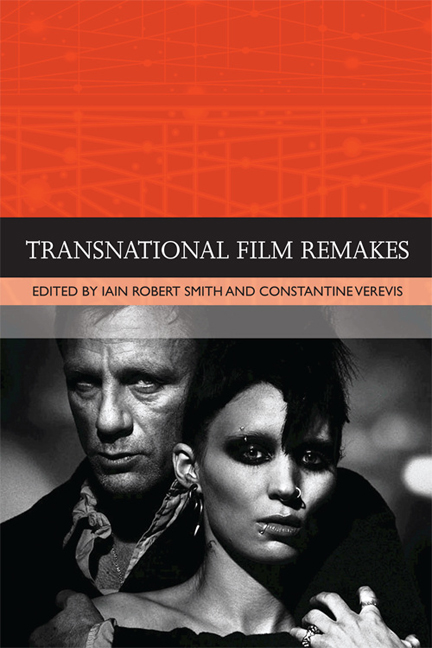Introduction: Transnational Film Remakes
Published online by Cambridge University Press: 22 December 2017
Summary
On 14 April 2016, Paramount Pictures released the first image of actress Scarlett Johansson in the lead role of the science-fiction film Ghost in the Shell (2017). This promotional image generated a great deal of controversy online, with much of the attention focused upon the decision to cast a white actress in the central role of cyborg Major Motoko Kusanagi. This criticism was part of a wider critique of ‘whitewashing’ within Hollywood where white actors are cast in non-white roles – other notable examples include Mickey Rooney in Breakfast at Tiffany's (1961) and Emma Stone in Aloha (2015) – yet this particular instance was especially controversial as Ghost in the Shell is a Hollywood remake of a 1995 Japanese anime (and manga) and therefore raised further issues surrounding planned changes to the source text. In fact, many of the initial reports on the controversy (Abad-Santos 2016; Child 2016; Loughrey 2016) cited a series of tweets by comic-book writer Jon Tsuei in which he expressed concern that the Hollywood remake would lose the cultural resonance that the source text's themes have with Japan's post-World War II history. Central to Tsuei's argument was the notion that Ghost in the Shell is a text deeply rooted in a specific era of Japanese technological development, and that it should therefore be understood as ‘inherently a Japanese story, not a universal one’ (Tsuei 2016a). Consequently, Tsuei's objection was not only to the casting of a white actress in the lead role but also to the very decision to produce a Hollywood remake, arguing that ‘You can “Westernize” the story if you want, but at that point it is no longer Ghost in The Shell because the story is simply not Western’ (Tsuei 2016b). This intervention generated a substantial amount of online debate, and was soon followed by an influential article on Nerds of Color that argued that ‘the relevance Ghost in the Shell has to Japanese culture is something that should be honoured in any live-action production’ and that, by producing this kind of remake, ‘Hollywood is destroying what makes properties like these special and valuable’ (Jones 2016).
- Type
- Chapter
- Information
- Transnational Film Remakes , pp. 1 - 18Publisher: Edinburgh University PressPrint publication year: 2017



